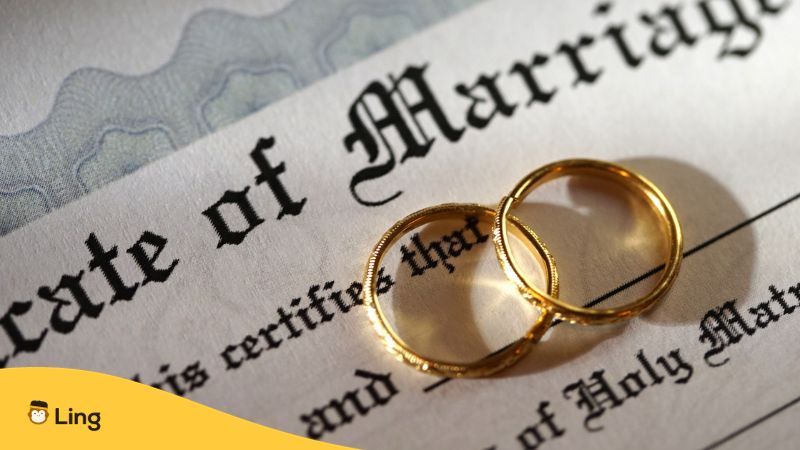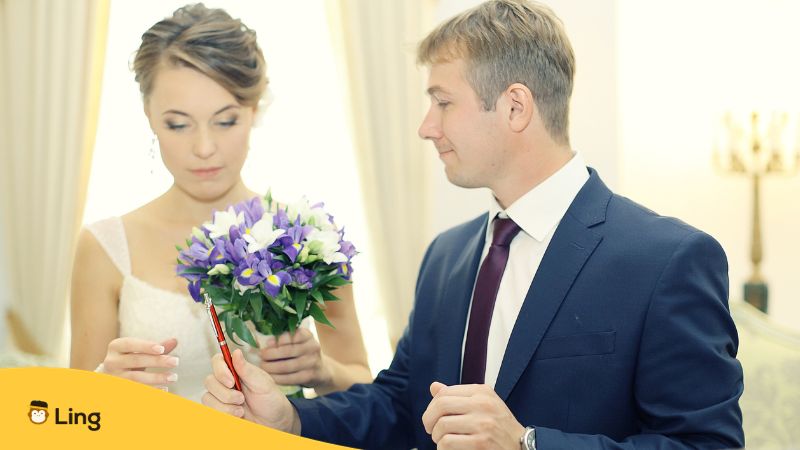So you and Pinoy bae decided to take the plunge and get hitched? Congrats! Before you start pinning seaside reception ideas on Pinterest and learning Tagalog phrases, you might wanna sort out the first question: Do you want to have a church wedding or a civil wedding in the Philippines?
Deciding on whether to have a church or civil wedding in the Philippines can be a tricky choice for engaged couples. Your family may have their hearts set on a traditional Catholic ceremony, while you and your partner envision something more low-key and intimate.
As someone who has many friends tie the knot in the Philippines, I’ve seen both stunning cathedral weddings and simple, emotional civil ceremonies. And honestly? There’s literally no right or wrong option! It really just comes down to what resonates most with you and your fiancé’s wishes.
Take the case of my close friend Ria who recently married her long-term Japanese boyfriend. After intense pressure from her devout mother for a church wedding, plus bureaucratic obstacles for her foreign fiancé, Ria and Hideki opted for a civil ceremony instead.
And I kid you not… THIS is a big deal in the country! I mean, it’s as if the battle lines were drawn. Team Church clashed with Team Civil. Each side had their reasons.
While Ria did have moments of regret about forfeiting the elaborate church celebration, ultimately, the civil wedding was hands down PERFECT for them. It reflected their laidback sensibility beautifully. And they happily pocketed the money they saved for a dream Boracay honeymoon!
If you too are feeling torn between church and civil, I’m here to help! Having attended dozens of weddings in the Philippines, I can walk you through everything you need to consider, including:
- Key differences between church and civil matrimony
- Benefits and drawbacks of each ceremony route
- Step-by-step guide to getting legally married in the Philippines
- Budget breakdown – church versus civil wedding costs
Let me guide you through the options so you can confidently decide on the perfect ceremony to kick off your exciting new chapter together. Let’s begin!
Table Of Contents
Are Civil Weddings Popular In The Philippines?
Has the classic church wedding lost its sparkle for younger generations of Filipino couples? Over the last decade, quick and fuss-free civil ceremonies have surged exponentially in popularity across the islands. Motivating this trend? The promise of significant savings for pragmatic millennial partners focused more on their budding marriage than a lavish one-day event.
Intimate civil rites at municipal halls now account for over 38.6% of registered unions in the Philippines. Their sheer affordability and efficiency appeal greatly to couples on a budget. For those with under 5,000 pesos to spare, staging a full-blown cathedral affair is out of the question. Instead, practical pairs opt for the equally romantic allure of low-key legal vows with nobody but each other and the judge.
However, for Filipinos who still pine for even a touch of nuptial tradition minus the gigantic price tag, mass wedding ceremonies (or kasalang bayan) have emerged as the perfect middle ground. Towns and cities across the Philippines now offer these community wedding events allowing dozens of couples to legally marry simultaneously. While still simple and no-frills, sharing the occasion with other brides and grooms adds a festive layer of fun for all.
So civil weddings have absolutely gained esteem as a legitimate, meaningful way to kick off forever in the Philippines. But more than mere acceptance, I’d argue newlyweds choosing this route are pioneering a new norm built on individuality and meaning over expectation and extravagance. And that’s something worth cheering loud enough to wake the whole barangay!

Church Wedding Vs. Civil Wedding In The Philippines
The Civil Wedding Route In The Philippines
Opting for a civil ceremony or kasal sa huwes often appeals to couples desiring a simpler, more low-key event focused on their intimate love. Civil weddings let you bypass lengthy Catholic requirements, instead dealing only with your Local Civil Registrar to make it legally binding.
The ceremony itself is no-frills – you gather with your witnesses at the nearest city hall or a judge’s chambers, recite standard vows, and then sign papers to seal the deal. Zero stress about church regulations or nosy opinions from the peanut gallery! The only drawback? Very few options to personalize the whole event. Basically, its in-and-out is simplicity.
Cost Of Civil Wedding In The Philippines
For couples seeking a simplified, budget-friendly wedding, civil ceremonies offer affordable nuptials without skimping on romance. Here are realistic expenses to expect:
Venue Fees
Host your ceremony for free at your local Municipal Hall or pay $100-300 to rent more intimate restaurant/garden venues. Sometimes, the venue may also depend on who you want to officiate the civil wedding ceremony. For instance, you may tap the following:
- Presiding Justice or Justices of the Court of Appeals
- Judges of the Courts of First Instance
- Mayors
- Municipal judges
- Justices of the peace
- Chief Justice and Associate Justices of the Supreme Court
- Priests, rabbis, ministers of any church, religion, or sect who are registered
- Military commanders
- Consuls and vice consuls in special cases
While most of the ones we covered in the list above are usually FREE, you may also encounter provincial offices that’ll require you to pay a solemnization fee of about 300 pesos.
Wedding Attire
Skip fancy gowns and barong tagalogs for simple yet elegant dresses and suits costing $200-500 total. The same can be said for your attendees since they can wear whatever conservative clothing they have.
Catering
Keep your guest list under 50-70 attendees for cheaper catering rates of around $10/head. And if you do decide to keep the guests on the low side, you can easily have the after-wedding celebration at restaurants even without a reservation!
Extras
Add basic photography, flowers, and a petite cake for just $500-800. No need for a costly wedding planner.
So the total cost? You can easily keep civil wedding costs under $2,000, especially if you opt out of a reception. Slash the guest list further for even more savings – focus on those nearest to your heart.
The Church Wedding Experience In The Philippines
For many Filipino families, a traditional Catholic church wedding fulfills expectations and dreams handed down by generations. Walking down the aisle of an ornately decorated cathedral, hundreds of guests watching, the elaborate ceremony officiated by a priest – it’s the quintessential fairytale version we’ve long imagined.
Beyond tradition, one big advantage of church weddings is you get to personalize many elements to your liking. Write your own heartfelt vows, select romantic readings and songs, and even dictate certain aspects of the ceremony based on your wishes. Just be prepared that priests have final authority over what is and isn’t allowed.
Cost Of Church Wedding In The Philippines
Planning a traditional church wedding for that fairytale bridal experience? Be prepared to invest a decent penny to pull off your dream cathedral celebration. Here’s a realistic breakdown:
Venue Fees
Popular Manila cathedrals like San Agustin or Manila Cathedral start around $300-500 for basic ceremony services. Provincial churches are more affordable at $100-300. Parish donations may also be politely requested.
Wedding Attire
The bride’s gown averages $500+ from local designers, though sky’s the limit for couture. The groom’s barong tagalog runs $200+, while entourage members require coordinated outfits.
Catering
Figure $15-30 per head for wedding breakfast/lunch packages or cocktail dinner receptions. For 300 guests, costs stack up quickly to $4,500+.
Wedding Planner
Hiring a coordinator or full-service planner ranges from $500 for day-of support to $2,000+ for an all-inclusive expert.
Extras
Photography, videography, floral arrangements, decoration, invitations, bands/DJs, and gifts for godparents add at least $3,000-5,000 cumulatively.
All said, mid-sized church weddings in the Philippines with 200-300 guests average a total cost of $10,000-$25,000. Luxury affairs can balloon much higher. Mitigate costs where possible, but brace for extravagance!
Wedding Churches In The Philippines
From the name itself, a church wedding means that the venue will be the couple’s choice of church. And let me tell you, Saying “I do” in one of the Philippines’ many breathtaking cathedrals promises sacred splendor on your special day. Here are 5 of the most sought-after wedding venues and what makes them such divine settings to start forever:
Manila Cathedral
Location: Cabildo, 132 Beaterio St, Intramuros, Manila
As one of the oldest and most iconic churches in Manila, The Manila Cathedral dazzles with its towering domes, radiant rose windows, and intricate relief carvings. The spacious interior bathed in natural light creates a warm, welcoming glow for your nuptials.
San Agustin Church
Location: General Luna St, Intramuros, Manila, 1002 Metro Manila
The oldest stone church in the Philippines, San Agustin wows couples with its intricately carved stone façade and tranquil interior dating back to 1606. Stately arches, geometric frescoes, and grand pipe organ provide an atmosphere of grandeur perfect for traditional weddings.
Taal Basilica
Location: VWJF+6WV, Calle San Martin, Taal, 4208 Batangas
Proclaim your love in the largest Catholic church in Asia! The Taal Basilica awes with its impressive Spanish colonial architecture, towering spires, and rich embellishments. Against picturesque views of the surrounding Taal volcano, it’s a breathtaking backdrop.
Christ The King Parish
Location: Green Meadows Ave, Quezon City, 1110 Metro Manila
This contemporary Catholic church features soaring pillars, modern stained glass, and an open sanctuary bathed in natural light. The minimalist yet striking architecture symbolizes unity and simplicity – perfect for couples wanting a sleek, non-traditional church wedding.
Chapel On The Hill
Location: Don Bosco Batulao, Brgy. Cahil, Calaca Batangas, c/o Tagaytay Post Office, Tagaytay, 4120 Batangas
This intimate chapel, situated on a verdant mountainside, offers panoramic views of Taal Lake through floor-to-ceiling windows. The small yet inspiring space provides a soothing connection with nature – ideal for spiritual couples seeking a magical garden wedding venue near Manila.

Requirements For A Civil Wedding As A Foreigner
Planning that sweet, stress-free civil ceremony with your Filipino fiancé? As an expat getting hitched, you just need to take care of a few bureaucratic prerequisites with patience, and your paperwork will sail smoothly! Here’s your necessity checklist:
Secure Your Certificate Of Legal Capacity To Marry
Pop by your embassy and apply for this mandatory document confirming your status as single and legally fit to marry. Bring your passport, birth certificate, and proof you’ve never been married before. Allow 2-4 weeks for processing, then pick it up and have it authenticated by the Department of Foreign Affairs.
Obtain CENOMAR From Your Partner
Ask your Filipino fiancé to request their Certificate of No Marriage Record from the Philippine National Statistics Office. This document is super important because it proves no existing marriages that could invalidate yours! Generally, it costs Php195 per copy for walk-in applications and Php430 for online applications. Processing takes 7-10 days, then ready for pickup.
Divorce Decree Requirement
For a foreigner who was previously married, an additional requirement is providing an authenticated Divorce Decree. This officially confirms the dissolution of your past marriage, granting legal clearance to wed again.
To obtain, contact your embassy or consular office back home requesting a copy of the original divorce documentation. Once sourced, submit the decree to the Philippine Department of Foreign Affairs (DFA) and pay the consular fee, which is around USD 25.00. Here they will process and verify its legitimacy.
Death Certificate Requirement
Now, if you have a spouse who has passed, you must similarly furnish a Death Certificate as part of your civil wedding paperwork. This officially confirms your eligibility to remarry. For this, you can simply contact your embassy or consular office in your home country to obtain an original death certificate for your deceased spouse. Submit this document to the Philippines Department of Foreign Affairs (DFA) for authentication and verification.
Be sure to order your Death Certificate early on, confirming with DFA how many days/weeks their approval process takes. You’ll want this properly authorized in the system with time to spare before your wedding date.
Secure Your Marriage License Application Form
A key requirement is completing the Marriage License Application form, provided by your local civil registrar’s office. Note that this paperwork differs across towns and cities, so be sure to obtain the exact documents required for your specific municipality or region.
You and your fiancé must fill out four copies total of everything. Here’s where those four copies go for processing:
- One for you to keep
- One submitted to the National Office of the Civil Registrar-General
- One given to the office that will solemnize/host your ceremony
- The last is kept on file as your official marriage record
Either you or your partner can go in person to claim the forms initially. If sending a friend or family member to obtain the paperwork on your behalf, they’ll need an authorization letter granting permission.
When you get the application documents, scrutinize every detail carefully! Double-check that names are spelled properly and that dates/locations are accurate. Even small mistakes could invalidate or delay your license. If anything seems amiss, request corrections on the spot and have staff countersign next to amended information.
Barangay Certificate From Your Partner
Another must-have is an official Barangay Certificate from your fiancé’s local district office. This document legally confirms their residence in that area of town/city.
To apply, visit your partner’s local Barangay Hall in person and state to the officer that you need a certificate for an upcoming marriage. Fill out the provided application and submit your fiancé’s up-to-date Community Tax Certificate (Cedula) for ID verification.
A small processing fee is usually under 100 pesos. Approval is quick – expect same-day service. With the Barangay Certificate stamped and ready, you’ve checked off one more box in your pre-nuptial admin work!
Passport Photocopies
Provide legible copies of both your passports (with a valid visa) as proof of ID. Double check copies have:
- Clearly visible passport identification page
- No cuts off sides, blurs, or dark spots
- Legible personal details and signatures
Well-lit images or digital scans provide the best results. Re-take any doubtful quality photocopies to avoid rejected paperwork!
Attend Pre-Marriage Counseling
Yes, pre-marriage counseling is mandated for civil license applicants as well. Attend a counseling session together 4-6 weeks before your wedding date with an accredited counselor.
You’ll discuss topics like relationship readiness, expectations for married life, legal rights, and responsibilities – basically confirming you enter marriage with open communication. Counselors also verify your free choice without force. These 1-2 hour chats are gentle and reassuring rather than interrogative!
Another point to remember here is that when you and your partner are 25 years old or younger, you may be required to attend a family planning seminar or a responsible parenthood seminar. This is usually half a day long and is held near the civil registry department.
Apply For Your Marriage License
The final step is submitting your application with all requirements 120 days before the wedding and then paying licensing fees (can range from ₱250 to ₱352, depending on the city) to receive your approved marriage license. After submitting the application and requirements, it takes about 7 to 10 business days to receive the marriage license.

Tagalog Phrases For Civil Wedding Preparation
Navigating paperwork and bureaucratic offices for your civil ceremony? These handy Tagalog phrases will help conversations go smoothly:
Requesting Documents
“Mayroon ba kayong form ng marriage license application?”
Translation: “Do you have a marriage license application form?”
Use this to inquire if they have the specific paperwork you’ll need to apply for your license.
Asking Questions
“Paano ko ito sasagutin?”
Translation: “How do I fill this out?”
“Ano pang kailangan kong dokumento?”
Translation: “What other documents do I need?”
Ask for help on properly completing forms or clarify remaining requirements needed.
Seeking Help
“Matutulungan ninyo ba ako?”
Translation: “Can you help me?”
“Hindi ko maintindihan. Paki-ulit po”
Translation: “I don’t understand. Can you repeat that?”
All of the examples we covered above politely request assistance with confusing areas.
Clarifying Information
“Tama ba ang spelling ng pangalan ko rito?”
Translation: “Is my name spelled correctly here?”
“Ilang araw bago ko makuha?”
Translation: “How many days before I can get this?”
Double-check critical details like names/dates and get estimated timeframes for document processing.
Expressing Thanks
“Maraming salamat po!”
Translation: “Thank you very much!”
“Nagpapasalamat ako sa inyong tulong”
Translation: “I’m grateful for your help”
Showing gratitude for help goes a long way in building a good rapport with local bureaucrats guiding your paperwork journey!
Fluently Navigate Your Wedding Prep With Ling
Getting married in the Philippines is an exciting adventure that mixes sweet romance with its fair share of paperwork hurdles. But equipped with patience – and now the know-how from this guide – you can master the civil wedding process with no stress!
If you want to continuously build on your Tagalog language progress to navigate all those bureaucratic conversations ahead, we highly recommend the Ling app.
Ling offers superb beginner lessons along with key phrases and dialogue examples that expand your confidence chatting in Tagalog poco a poco. Plus, its fun and effective features are accessible right from your smartphone.
So don’t be intimidated as you and your love work through requirements. Just rely on this guide, practice your new phrases, and before you know it, you’ll be exchanging heartfelt “I do’s” surrounded by the ones you cherish most! We wish you a blissful forever.































































